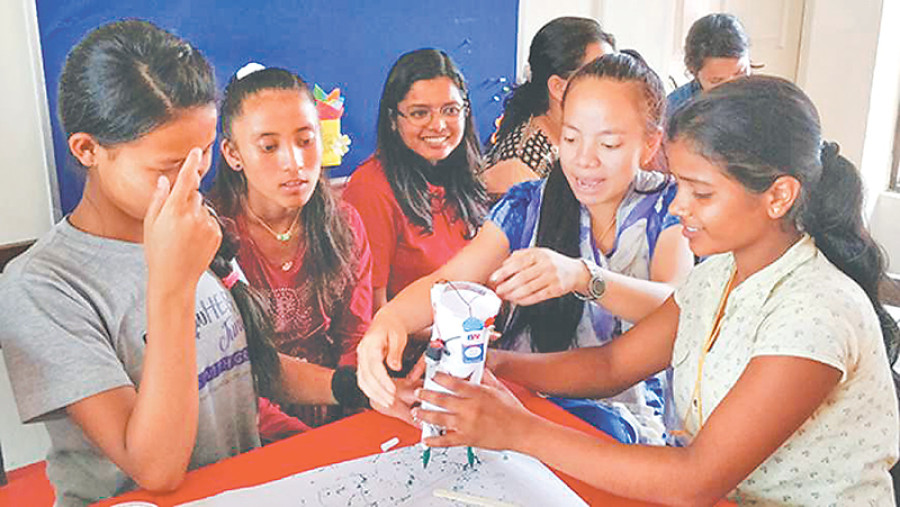Valley
Teach for All conference starts in Capital today
Teach for Nepal (TN) will share its success stories and its contribution to transform public education in Nepal to the world at the Global Conference of Teach for All starting here on Wednesday.
Teach for Nepal (TN) will share its success stories and its contribution to transform public education in Nepal to the world at the Global Conference of Teach for All starting here on Wednesday.
The annual conference assembles worldwide members of the network to connect, learn, and exchange new ideas.
Although on a small scale, TN has made good progress in teaching and learning activities in the public schools since its inception in 2013.
Chandeswari Secondary School in southern Lalitpur is an example. It is the district’s only public school with zero pass outs in the School Leaving Certificate examination held in 2013. This was one of the major reasons for TN to choose it in its first year.
Five years later, all students who took Secondary Education Examination (SEE) through the school passed this year.
Surprising many, it is the first public school from Lalitpur district whose SEE graduate Sangita Jimba has received full scholarship to study International Baccalaureate in Germany.
TN fellow Nawang Sherpa, who taught students in the school for two years, is happy to note one of his students clinching full scholarship in Germany.
“Our initiative is to end the disparity in school education. Jimba proves we are succeeding in our goal,” Sherpa who manages fund-raising department at TN told the Post.
Concerned by the quality of education imparted in public schools, a group of Nepali youth, graduated abroad, conceived the TN initiative. It aims to transform public school education by mobilising outstanding university graduates and professionals in teaching.
The initiative selects a few dozens of TN fellows every year from hundreds of applicants and deputes them as full-time teachers in public schools for two years.
After receiving training, the fellows go to their respective schools and work to improve teaching and learning activities.
The initiative started with 15 schools in Lalitpur district. It has now expanded to 51 schools from five other districts - Sindupalchowk, Dhanusha, Dang, Lamjung and Parsa - which benefits 10,000 students.
TN Chief Executive Officer and co-founder Shishir Khanal said SEE results show there is massive improvement in quality of education in the schools where TN fellow work.
Government data shows 76 percent of students from public and private schools combined together scored 1.61 GPA or higher (the minimum grade for enrollment in Grade 11) this year. In contrast, over 95 percent students from schools covered by TN scored 1.61 and higher.
Science, English and Mathematics subjects have the highest failure rates in schools. Therefore, TN fellows teach these subjects in the public schools selected after thorough scrutiny. They receive Rs 17,000 as monthly stipend. This is half the salary secondary schools teachers receive. Schools bear 20 percent of the salary payments.
With the number of schools seeking TN’s intervention increasing, Khanal said, “They have told local governments pay full salary to TN teachers.”
The initiative is equally beneficial to the fellows as they are harnessing leadership skills through teaching and regular development training they receive, he said.
Although 48 countries run initiatives like TN, the peculiarity Nepal has is its engagement with the community. The fellows must spend their two years in the local level and mingle with the community and students.
This is the reason the three-day global conference’s theme is ‘Community at the Centre’, said Khanal.
“One aspect of putting community at the centre is ensuring voices and stories of those closest to the problems being addressed are central to the solutions. This is what we can proudly share in the conference,” he said.
Around 500 national and international delegates from 60 countries - 48 Teach for All member nations and 12 others - will take part in the conference that ends on Friday. Along with indoor presentations, the participants will visit schools in Lalitpur and Sindhupalchowk covered by TN.
“This is a huge platform to share and learn. While we have many success stories to share, we do get to learn best practices from other countries,” said Khanal.
Before closing the initiative, TN managers said they want to produce 6,000 alumni by 2030 who can take leadership roles to promote education and social change.
Currently around 80 percent of TN alumni are working on their own in different parts of the country to boost public education.
A team of such alumni is working to improve Bhanu Primary School at Sidhhipur in Lalitpur. The government was mulling to merge the school due to lack of students. The school had just 20 students two years ago, but with the TN, supporting in management and pedagogy, the number has increased to 125 this year.
Three schools in Budhanilkantha Municipality, and some in Dolpa and Solukhumbu are running similar programme.




 9.7°C Kathmandu
9.7°C Kathmandu













